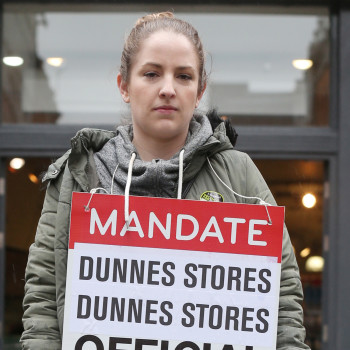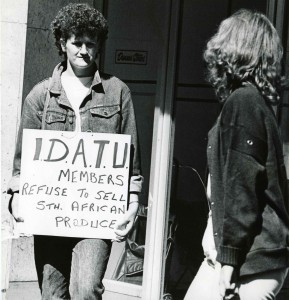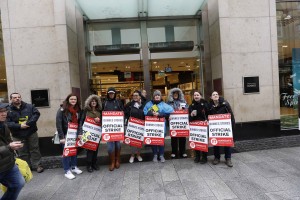A Dunne deal unhonoured

On Holy Thursday, 2 April, some 6,000 employees, approximately 60% of Dunnes Stores’ workforce, picketed outside 109 stores across the Republic of Ireland as part of Mandate Trade Union’s ‘Decency for Dunnes Workers’ campaign. Gillian Hamill met Mandate’s assistant general secretary Gerry Light several days in advance of the industrial action to learn more about what Dunnes’ workers are seeking to achieve
17 April 2015
What is the dispute about?
‘Zero hour contracts’ have been widely used as “a catch all phrase”, according to Mandate Trade Union assistant general secretary Gerry Light. However such contracts are actually illegal in the Republic of Ireland. The provisions of the Organisation of Working Time Act 1997 state that when employees are not given the hours they were requested to work, or made themselves available to work, they must be compensated for 25% of that time, or 15 hours, whichever is less. Mandate’s Gerry Light says the union is seeking to achieve a new minimum ‘banded hours’ contract of at least 18 – 20 hours a week.
“I think you can’t look either in Dunnes, in isolation at the banded hours without also looking at the excessive use of temporary contracts, which the company appears to roll over on a fairly regular basis, up to the maximum legal limit,” says Light. He believes that these two issues add up to “precarious working” situations.
Light adds: “It’s important to say that [the 15 hour minimum] was brought into effect in 1997, the year after the last major Dunnes Stores dispute, so we clearly point to the fact that the Dunnes Stores dispute was instrumental in the provisions that were put in [place].
The decision to hold the strike on Holy Thursday, traditionally a busy day for off-trade sales, was clearly a strategic one?
“I think most importantly what I would say about strikes is that they should only be used as a last resort,” says Light. “I think we have clearly established our bone fide in respect of [that].”
“Of course, it has to have an impact. I don’t think it has a huge impact on the shopping public to be truthful with you. It’s not like Dunnes is an essential service…However, yes, it was strategically picked and there’s no doubt about that, heading into a very busy trading period, it has to have some impact. We have to try and bring the business to the negotiating table.”
Planning the strike must have required a great deal of organisation?
“Huge, with 109 locations spread right across the country,” says Light. “There’s actually more than 109 because a [some] stores are [represented by] Siptu” which has 350 members within Dunnes. “There is also a great deal of logistics involved in “ensuring that you comply with your legal obligations under the current legislation. You have to give the proper notice and inform people of your intention to ballot them, the reasons why you’re balloting them and allow them access to you to answer their questions.
“The difficulty is hugely compounded when you don’t have access to the stores. If this was any other major retailer, even in the event of us engaging in a ballot for industrial action, you would get access to staff canteens but not in Dunnes.”
Light says that other major retailers such as Tesco “would have formal arrangements in place which allow for information and consultation agreed with the union and put together with the union. How far behind that scene is Dunnes Stores? And sadly at this stage…if this dispute goes ahead, they’re going to push themselves further down the line. They’re going to look more pre-historic in the eyes of the retail community and in the eyes of the public. So, yes, there are real dangers that the company could do irreparable damage to themselves but it would appear that they’re prepared to take that risk for the sake of non-interference in the family business. It’s a high risk strategy they’re playing but only they – and it’s a very small group – only they know the logic behind that and the extent to which they have worked this out to the point where it’s worth taking that risk.”
In a letter to staff, Dunnes Stores’ management said that under the State’s Constitution, it acknowledged, “every employee’s right” to belong to a trade union. However the company also emphasised its own Constitutional right to “disassociation”, ie, that it “is not obliged to nor must it talk or engage directly with trade unions”. How would you respond to this statement?
“Nobody could argue against that, that’s black and white. But what I would say to Dunnes, as I’ve been saying to them for the last number of months, this is not about being legally forced to do something. This is about doing something because it’s the right thing to do and there’s a moral responsibility on an employer and particularly an employer such as Dunnes Stores, who has established itself over many years now [and] is hugely profitable.
“I also think it’s important that Dunnes are, in so much as they can be, influenced by some of their major competitors who have sat down with us. Dunnes Stores seek to maintain a very substantial privilege and advantage over their main competitors by not coming to the negotiating table, and that’s wrong and on many occasions, the competitors would remind us of that.”
Light also described Dunnes’ statement as “disingenuous” in that it accepts workers’ right to belong to a union but “in the same paragraph” says it has no intention of engaging with that union. “That is hypocritical in the extreme,” he says.
What’s more, he believes the ‘Voluntaris’ concept on which Ireland’s industrial relations model is based, is essentially flawed when an employer such as Dunnes can effectively volunteer to ignore a Labour Court recommendation. “Last November, the Labour Court recommendation said Dunnes should sit down and meet us but they just ignored it,” he says.
In the same letter, Dunnes warned staff of possible layoffs and redundancies if “harm” was inflicted on the company as a result of industrial action. Do you believe this will occur?
“If there’s any harm inflicted on the company, to use that phrase, it’s going to be entirely down to the management’s behaviour. I’ve said it consistently [that] this dispute is entirely avoidable.
“It was unusual, Dunnes don’t tend to engage in correspondence and don’t put their thoughts very often on paper but that was a two page letter covering many issues…But really what annoyed and angered the employees most of all was the concluding remarks, that if this strike goes ahead it [could] lead to redundancies and layoffs and then nobody even bothered to sign the letter. They just said on behalf of Dunnes Stores. The level of annoyance and anger that created; people really lost whatever respect was there for Dunnes in relation to the position that they were trying to adopt or had adopted.
“[In relation to redundancies] I don’t see that happening. I think there are many other factors. Dunnes still have a very healthy portion of the overall market. I think they’re at around 23% of the market…They don’t release accounts, they’re very secretive, but one thing’s for sure, they’re extremely profitable with that level of the market, so I can’t see that. I think any potential for that happening, it’s entirely Dunnes that are creating that scenario.”
The company said the union’s real objective was to secure rights to represent Dunnes workers at store and national level. Is this true?
The 1996 agreement exists… born out of the disputes in 1996. It clearly sets out a very clear framework for the resolution of local and national disputes. This is not a traditional recognition dispute…There’s de facto recognition already established. As the Labour Court said, this is about getting Dunnes Stores to comply with their obligations under the 1996 agreement which in itself bestows de facto recognition.”
How many Dunnes workers are currently on the minimum 15 hours’ contract?
Light responds that it is difficult to answer this question precisely as unlike other major retailers, Dunnes has not provided this information. “All we can do is point you to the survey we conducted last year which was a very good survey in respect of the return rate,” says Light. “We got 1,200 responses from members and non-members within Dunnes.” The survey showed that 98% of workers want more stable hours and 85% say insecurity of hours and rostering is used as a method of control over workers.
Light adds: “In some cases, less hours do suit people, that’s what’s called voluntary engagement of part-time working. However the vast majority, and that survey proves it, of people are involuntarily engaged – they would work more hours if they got them.”
Yet Dunnes has defended its stance by pointing out that it has awarded two 3% pay increases for staff since 2014?
“It’s very important and I’m glad that they raised that. Although on both occasions it was following formal claims being served by the union. On the first occasion, we had submitted that claim to the Labour Court and on the eve of the Labour Court hearing, Dunnes announced in its stores that they were going to concede the 3%. Now that put us all in a bit of flux the next day. The court asked whether I wanted to remove that from the claim but I insisted that it be included in a formal recognition by the court simply because I couldn’t trust Dunnes 100% to actually deliver on that. It’s therefore very important to note that one of those 3% raises was actually given as a result of not only a claim being served by the union, but a recommendation in deed by the Labour Court.
“The second one they just naturally followed, once we served a claim last year. I would imagine they knew this was all building up, so somebody in their wisdom said, well maybe the best way to avoid all this is to pay the 3% and they paid it last year as well. So at a top level, it looks very impressive, 6% paid over the last two years.
“But it can pale into insignificance and go up in a puff of smoke rather quickly if we have contracts that are not regulated, in terms of the hours given on a weekly basis…In many cases, we suggest that workers as a result of getting the pay increase for an hourly rate, they can actually be worse off in they lose their hours. They must run in parallel. They’re two legs of a very important three-legged stool. One is the hourly increase, second is the banded contracts and the third leg is the permanency of those contracts, that they’re not temporary in nature and that a manager can’t say to you at a whim, ‘you’re gone’.
“It’s also important to remember that it’s a clear, statistically proven fact that for our members and workers, the vast majority of what they earn goes straight back into the domestic economy. It’s a virtuous circle, and we say unless you give that kick-start to the domestic economy, it’s going to be a prolonged recovery…We conservatively estimate that as a result of all the deals that we’ve done…it’s somewhere in excess of €30 million that we’ve achieved on behalf of our members. That’s not insignificant spending power and it’s also [more money] going back into the Exchequer.”
Do you believe Dunnes Stores’ management will agree to talk to you after the strike?
“I don’t know. I think to do my job you have to be the eternal optimist. I certainly know that while the same people might be at the helm of Dunnes Stores that were there in 1996, the world has changed around them. The marketplace has changed around them, Dunnes back in 1996 along with Quinnsworth and Superquinn, had a near monopoly situation in the market; they don’t have that any more. There is quite aggressive competitors out there, we’ve seen the likes of the Lidls and Aldis and the command that they have now achieved within the sector…Times have moved on and whatever principled opposition you have, if you retain that, you do run the risk of doing irreparable damage to the business.
“This is not about pride, this is not about swallowing pride or accepting an ultimatum being delivered either by ourselves or by their workers. This is about doing the sensible thing for the business and the morally correct thing for their workers. Nobody’s going to think any less of Dunnes [if they negotiate]; in fact the opposite.”
Unfortunately, following the strike on 2 April, Mandate has since reported that members all over the country have experienced dismissals, cuts to hours, changes in roles and changes in shift patterns.
Quotes from the Dunnes Stores strike

Even the Taoiseach has rowed in behind Dunnes Stores workers and implored Dunnes management to sort the situation out
“I support Dunnes Stores workers in their right to clarity as to their working lives. The message is that this can be sorted out.” An Taoiseach Enda Kenny
“This behaviour by management in Dunnes Stores is deplorable and despicable and must be condemned by everybody.” Gerry Light, Mandate assistant general secretary
“Regrettably Dunnes Stores is continuing their chosen path of conflict and intimidation. Their behaviour is akin to something you’d see 100 years ago and it is very clear their irresponsible behaviour is damaging the business.” Gerry Light, Mandate assistant general secretary
“I’m worried about going back into work tomorrow.” Michelle Rossiter, St Stephen’s Green shop steward
“We’re striking because we want secure hours, fair pay and proper union recognition.” A spokesperson for the pickets at Wexford
“I will be staying in close contact with workers and their representatives over the coming weeks and months. I am warning Dunnes Management against any listing, singling out, disciplining or unfair treatment of workers as a result of their participation in industrial action.” Sinn Féin MEP Liadh Ní Riada
“There’s an absence of dignity and decency in how Dunnes Stores are treating their workers.” Micheal Martin, Fianna Fail leader
Tweets from the public #Boycottdunnes
So Dunnes are sacking employees that took strike action. Never shopping there again. #BoycottDunnes
Good to see #BoycottDunnes trending this morning. Their treatment of workers cannot go on. Shame on @dunnesstores
Wow @dunnesstores bad, bad move & not cool. You’ve just earned yourself another boycotter!
I have a €50 voucher for Dunnes. I’ve never been as conflicted. #BoycottDunnes
Will continue to go out of my way to avoid Dunnes Stores until they decide to start treating their staff with respect #BoycottDunnes

Mary Manning, who was dismissed by Dunnes Stores back in 1984 for refusing to sell South African fruit, returned to the Dunnes Stores picket line on 2 April to support the workers on strike over the low hour contracts
Previous industrial action taken by or against Dunnes Stores
- Mandate, the union that organised the strike action on 2 April, says Dunnes is “the most difficult” retailer with which it has ever dealt. It does not negotiate with trade unions and doesn’t usually show up at Labour Court or Labour Relations Commission hearings.
- Dunnes has been named as a defendant in 448 cases, with Dunnes initiating just 29 cases as the plaintiff.
- In December 2014, Kerry Group, suppliers of Cheesestrings, accused Dunnes of trademark infringement when the retailer released a similar product called ‘Cheesy Strings’. Dunnes escalated matters by offering a ‘buy one get one free’ promotion in respect of Cheesy Strings. Dunnes eventually withdrew the product and the case was struck out.
- In 2013 Aldi sued Dunnes over price comparison adverts after it alleged that Dunnes had put up banners and labels in several stores conveying what Aldi said was a completely misleading impression that Dunnes products were cheaper.
- A 2011 case against Dunnes, taken byLarry Howard, its former head of finance accused Dunnes director Margaret Heffernan of ‘veiled and open threats’. The famous quote from this case was that Heffernan wanted “either f***ing men or mice” to help her run the business. Howard finally settled.
- In 2007, Karen Millen commenced legal proceedings against Dunnes Stores for copycat designs of its clothing. The case reached the European Court of Justice in 2014 and Dunnes lost.
- In 1995, 6,000 Dunnes workers went on strike over Sunday trading, zero-hours contracts, the proportion of full-time jobs and other issues. The strike lasted three weeks and cost Dunnes about £50 million.
- In 1984, Dunnes Stores workers began a strike that would last almost three years. Shop stewards gave a union instruction to colleagues not to handle any South African goods, in protest against the apartheid regime in the country at the time. When a 21-year-old cashier Mary Manning refused to put some fruit through the till, she was suspended and nine of her colleagues walked out the door with her. The government eventually banned South African goods from being sold in Ireland and this ban remained in place until the end of the apartheid regime.



 Print
Print






Fans 0
Followers